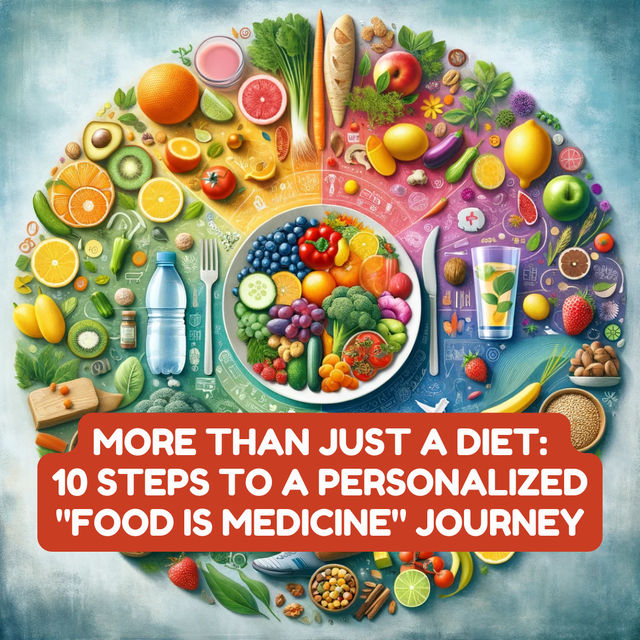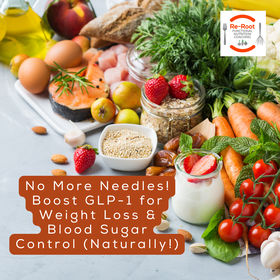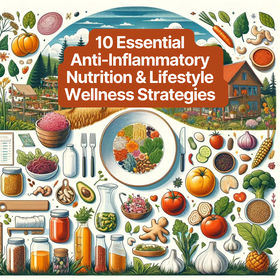
Battling Persistent Weariness, Joint Discomfort, or Mental Fog?
Could these seemingly unrelated symptoms be linked by a common thread? Often, the silent disruptor is chronic inflammation, quietly undermining your vitality, emotional state, and cognitive performance. While quick fixes and trendy diets claim to offer swift solutions, they frequently fall short.
Enter the transformative concept of “Food Is Medicine," a powerful strategy that leverages the remarkable abilities of certain foods to tackle the core issues behind your health challenges, leading to a more vibrant state of well-being.
How “Food Is Medicine" Stands Out from Other Approaches:
Addresses the Core Issue: This method goes beyond superficial remedies, targeting the root inflammatory processes to foster lasting health benefits.
Tasty and Feasible: Forget about monotonous dieting; this is about adding delicious, nutrient-packed foods to your diet, making it easier to maintain healthy habits.
Customized for You: Acknowledging that everyone's body and lifestyle are unique, this approach customizes dietary plans for the best outcomes, considering your individual biochemistry and lifestyle habits.
A Comprehensive View: It extends beyond just what you eat, highlighting the importance of sleep, stress reduction, and physical activity in achieving overall health.
Specifically, How Does “Food Is Medicine" Combat Chronic Inflammation?
Key strategies include:
Stabilizing Blood Sugar Levels:
Fluctuations in blood sugar, often due to processed carbs and sugary snacks, can lead to hormonal imbalances and exacerbate inflammatory processes. By focusing on whole grains that are free from gluten, healthy fats, lean proteins, and fruits low in natural sugars, this approach helps maintain steady blood sugar levels, nipping inflammation in the bud.
Boosting Gut Health:
The health of your gut microbiome, with its trillions of microbes, is critical in managing inflammation. A flourishing gut microbiome produces beneficial short-chain fatty acids and keeps detrimental bacteria at bay. Including fermented foods, prebiotics, and probiotics in your diet supports a healthy gut, thus creating an internal environment that combats inflammation.
Embarking on the “Food is Medicine" Path:
Diversify with Colors: Strive for at least ten servings of a variety of colored fruits and vegetables every day. Each color represents different antioxidants, which help reduce inflammation.
Choose Complex Carbs: Opt for whole grains over processed ones to avoid blood sugar spikes and support your gut health with their high fiber content.
Opt for Healthy Fats: Foods rich in omega-3 fatty acids, like avocados and certain fish, can significantly reduce inflammation.
Reduce Sugar Intake: Watch out for hidden sugars in processed foods, choosing naturally sweet fruits instead.
Incorporate Anti-Inflammatory Spices: Spices like turmeric and ginger add flavor and combat inflammation.
Fermented Foods Are Your Friends: Items like kimchi and kefir introduce beneficial probiotics to your gut.
Hydration is Key: Proper hydration supports detoxification and reduces inflammation.
Don't Underestimate Sleep: Quality sleep is crucial for managing inflammation.
Keep Stress in Check: Stress management is essential for controlling inflammation.
Stay Active: Regular exercise helps reduce inflammation and boosts overall health.
Your Journey to Health Through Nutrition:
This isn't about quick fixes but a sustainable, tailored journey toward better health by nourishing your body and embracing a lifestyle that supports your well-being. Experiment, adapt, and celebrate every step forward.
For personalized guidance, consider partnering with Joseph Bershad, where I can tailor a plan to your specific health goals and needs.







